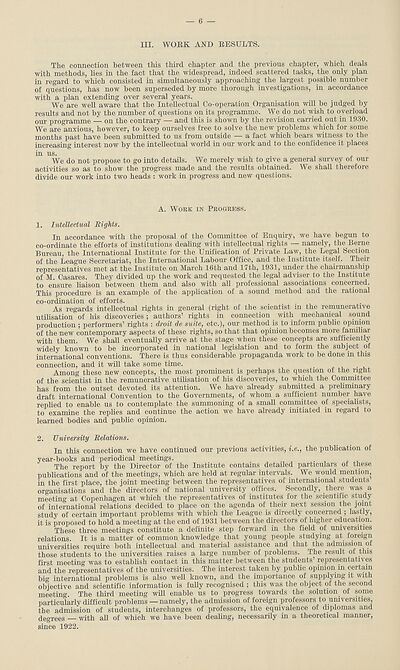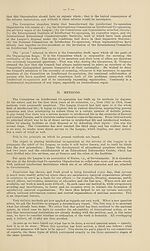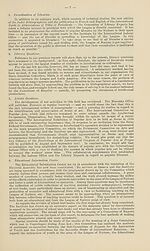International > Report by the committee on the work of its ... plenary session > Thirteenth plenary session
(6)
Download files
Complete book:
Individual page:
Thumbnail gallery: Grid view | List view

— 6 —
III. WORK AND RESULTS.
The connection between this third chapter and the previous chapter, which deals
with methods, lies in the fact that the widespread, indeed scattered tasks, the only plan
in regard to which consisted in simultaneously approaching the largest possible number
of questions, has now been superseded by more thorough investigations, in accordance
with a plan extending over several years.
We are well aware that the Intellectual Co-operation Organisation will be judged by
results and not by the number of questions on its programme. We do not wish to overload
our programme — on the contrary — and this is shown by the revision carried out in 1930.
We are anxious, however, to keep ourselves free to solve the new problems which for some
months past have been submitted to us from outside — a fact which bears witness to the
increasing interest now by the intellectual world in our work and to the confidence it places
in us.
We do not propose to go into details. We merely wish to give a general survey of our
activities so as to show the progress made and the results obtained. We shall therefore
divide our work into two heads : work in progress and new questions.
A. Work in Progress.
1. Intellectual Rights.
In accordance with the proposal of the Committee of Enquiry, we have begun to
co-ordinate the efforts of institutions dealing with intellectual rights — namely, the Berne
Bureau, the International Institute for the Unification of Private Law, the Legal Section
of the League Secretariat, the International Labour Office, and the Institute itself. Their
representatives met at the Institute on March 16th and 17th, 1931, under the chairmanship
of M. Casares. They divided up the work and requested the legal adviser to the Institute
to ensure liaison between them and also with all professional associations concerned.
This procedure is an example of the application of a sound method and the rational
co-ordination of efforts.
As regards intellectual rights in general (right of the scientist in the remunerative
utilisation of his discoveries ; authors’ rights in connection with mechanical sound
production ; performers’ rights : droit de suite, etc.), our method is to inform public opinion
of the new contemporary aspects of these rights, so that that opinion becomes more familiar
with them. We shall eventually arrive at the stage when these concepts are sufficiently
widely known to be incorporated in national legislation and to form the subject of
international conventions. There is thus considerable propaganda work to be done in this
connection, and it will take some time.
Among these new concepts, the most prominent is perhaps the question of the right
of the scientist in the remunerative utilisation of his discoveries, to which the Committee
has from the outset devoted its attention. We have already submitted a preliminary
draft international Convention to the Governments, of whom a sufficient numbei have
replied to enable us to contemplate the summoning of a small committee of specialists,
to examine the replies and continue the action we have already initiated in regard to
learned bodies and public opinion.
2. University Relations.
In this connection we have continued our previous activities, i.e., the publication of
year-books and periodical meetings. .
The report by the Director of the Institute contains detailed particulars of these
publications and of the meetings, which are held at regular intervals. We would mention,
in the first place, the joint meeting between the representatives of international students’
organisations and the directors of national university offices. Secondly, there was a
meeting at Copenhagen at which the representatives of institutes for the scientific study
of international relations decided to place on the agenda of their next session the joint
study of certain important problems with which the League is directly concerned ; lastly,
it is proposed to hold a meeting at the end of 1931 between the directors of higher education.
These three meetings constitute a definite step forward in the field of universities
relations. It is a matter of common knowledge that young people studying at foreign
universities require both intellectual and material assistance and that the admission o
those students to the universities raises a large number of problems. The result of this
first meeting was to establish contact in this matter between the students’ representatives
and the representatives of the universities. The interest taken by public opinion m certain
big international problems is also well known, and the importance of supplying it with
objective and scientific information is fully recognised ; this was the object of the second
meeting The third meeting will enable us to progress towards the solution of some
particularly difficult problems — namely, the admission of foreign professors to universities,
the admission of students, interchanges of professors, the equivalence of diplomas and
degrees — with all of which we have been dealing, necessarily in a theoretical manner,
since 1922.
III. WORK AND RESULTS.
The connection between this third chapter and the previous chapter, which deals
with methods, lies in the fact that the widespread, indeed scattered tasks, the only plan
in regard to which consisted in simultaneously approaching the largest possible number
of questions, has now been superseded by more thorough investigations, in accordance
with a plan extending over several years.
We are well aware that the Intellectual Co-operation Organisation will be judged by
results and not by the number of questions on its programme. We do not wish to overload
our programme — on the contrary — and this is shown by the revision carried out in 1930.
We are anxious, however, to keep ourselves free to solve the new problems which for some
months past have been submitted to us from outside — a fact which bears witness to the
increasing interest now by the intellectual world in our work and to the confidence it places
in us.
We do not propose to go into details. We merely wish to give a general survey of our
activities so as to show the progress made and the results obtained. We shall therefore
divide our work into two heads : work in progress and new questions.
A. Work in Progress.
1. Intellectual Rights.
In accordance with the proposal of the Committee of Enquiry, we have begun to
co-ordinate the efforts of institutions dealing with intellectual rights — namely, the Berne
Bureau, the International Institute for the Unification of Private Law, the Legal Section
of the League Secretariat, the International Labour Office, and the Institute itself. Their
representatives met at the Institute on March 16th and 17th, 1931, under the chairmanship
of M. Casares. They divided up the work and requested the legal adviser to the Institute
to ensure liaison between them and also with all professional associations concerned.
This procedure is an example of the application of a sound method and the rational
co-ordination of efforts.
As regards intellectual rights in general (right of the scientist in the remunerative
utilisation of his discoveries ; authors’ rights in connection with mechanical sound
production ; performers’ rights : droit de suite, etc.), our method is to inform public opinion
of the new contemporary aspects of these rights, so that that opinion becomes more familiar
with them. We shall eventually arrive at the stage when these concepts are sufficiently
widely known to be incorporated in national legislation and to form the subject of
international conventions. There is thus considerable propaganda work to be done in this
connection, and it will take some time.
Among these new concepts, the most prominent is perhaps the question of the right
of the scientist in the remunerative utilisation of his discoveries, to which the Committee
has from the outset devoted its attention. We have already submitted a preliminary
draft international Convention to the Governments, of whom a sufficient numbei have
replied to enable us to contemplate the summoning of a small committee of specialists,
to examine the replies and continue the action we have already initiated in regard to
learned bodies and public opinion.
2. University Relations.
In this connection we have continued our previous activities, i.e., the publication of
year-books and periodical meetings. .
The report by the Director of the Institute contains detailed particulars of these
publications and of the meetings, which are held at regular intervals. We would mention,
in the first place, the joint meeting between the representatives of international students’
organisations and the directors of national university offices. Secondly, there was a
meeting at Copenhagen at which the representatives of institutes for the scientific study
of international relations decided to place on the agenda of their next session the joint
study of certain important problems with which the League is directly concerned ; lastly,
it is proposed to hold a meeting at the end of 1931 between the directors of higher education.
These three meetings constitute a definite step forward in the field of universities
relations. It is a matter of common knowledge that young people studying at foreign
universities require both intellectual and material assistance and that the admission o
those students to the universities raises a large number of problems. The result of this
first meeting was to establish contact in this matter between the students’ representatives
and the representatives of the universities. The interest taken by public opinion m certain
big international problems is also well known, and the importance of supplying it with
objective and scientific information is fully recognised ; this was the object of the second
meeting The third meeting will enable us to progress towards the solution of some
particularly difficult problems — namely, the admission of foreign professors to universities,
the admission of students, interchanges of professors, the equivalence of diplomas and
degrees — with all of which we have been dealing, necessarily in a theoretical manner,
since 1922.
Set display mode to:
![]() Universal Viewer |
Universal Viewer | ![]() Mirador |
Large image | Transcription
Mirador |
Large image | Transcription
Images and transcriptions on this page, including medium image downloads, may be used under the Creative Commons Attribution 4.0 International Licence unless otherwise stated. ![]()
| League of Nations > International > Report by the committee on the work of its ... plenary session > Thirteenth plenary session > (6) |
|---|
| Permanent URL | https://digital.nls.uk/195316458 |
|---|
| Attribution and copyright: |
|
|---|---|
| Shelfmark | LN.XII.5 |
|---|---|
| Shelfmark | LN.XII |
|---|
| Description | Over 1,200 documents from the non-political organs of the League of Nations that dealt with health, disarmament, economic and financial matters for the duration of the League (1919-1945). Also online are statistical bulletins, essential facts, and an overview of the League by the first Secretary General, Sir Eric Drummond. These items are part of the Official Publications collection at the National Library of Scotland. |
|---|---|
| Additional NLS resources: |
|

